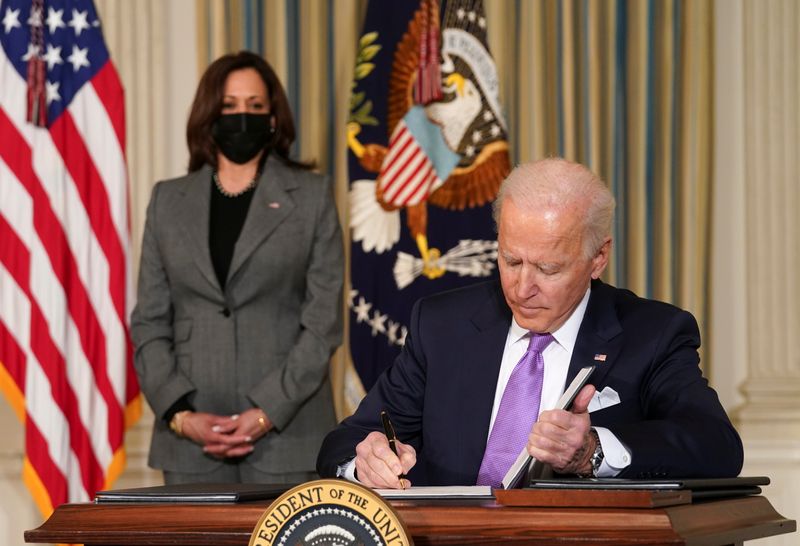By Jarrett Renshaw
(Reuters) - In his first week in office, U.S. President Joe Biden has rolled out a wave of executive orders to fulfill a roster of campaign promises, underscoring just how easy it is to reverse some of the policies of his predecessor, Donald Trump.
As of Wednesday morning, Biden had cranked out some 40 executive orders, nearly half of them overturning Trump mandates. With one stroke of the pen, the United States rejoined the Paris climate accord and with another, Biden blocked funds for a border wall with Mexico.
On Wednesday, he planned to sign orders canceling new oil and gas leases on federal lands and making climate change a national security priority.
Trump counted among his enduring achievements his 2017 tax reform bill in Congress and his appointment of three Supreme Court justices. Many of his other signature actions were enacted via executive order, making them vulnerable to rapid reversal. Some had rolled back actions of his predecessor, Barack Obama.
Biden is "going through a lot of the Trump agenda and dismantling it because (Trump's) agenda was put into place this way," said Julian Zelizer, a presidential historian at Princeton University.
"So, it’s kind of a very transitory way to govern," he said.
U.S. presidents since George Washington have enacted executive orders for policy changes big and small. Recent administrations have leaned heavily on them for meaningful, controversial changes in the face of stiff partisan opposition in Congress.
Biden’s executive actions are sure to prompt fresh court battles or reignite existing ones, just as Trump's did. Absent congressional legislation that cements the policies into law, the conservative-leaning Supreme Court could have the final say.
This transitory governance complicates long-term planning for issues like climate change and gives U.S. companies heartburn.
"Our industry measures commitment in decades, with very large capital investments to be utilized over many decades, so a whipsaw approach is not conducive to that," said Derrick Morgan, a senior vice president for federal and regulatory affairs at American Fuel and Petrochemical Manufacturers, the nation’s largest refining trade group.
The refining group and the U.S. Chamber of Commerce, the country's biggest and most influential business lobby, are begging Congress to make laws instead.
CONGRESSIONAL DIVIDE
There are early signs Trump's fellow Republicans may balk at partnering on legislation with Biden's fellow Democrats, who narrowly control the Senate and House of Representatives.
The Republican National Committee, led anew by Trump ally Ronna McDaniel after her re-election this month, was quick to criticize Biden's rollback of Trump's agenda as "executive fiat" in a fundraising email, without acknowledging many of Trump's positions were established the same way.
Phil Schiliro, who served as Democratic President Barack Obama’s director of legislative affairs, said Obama only began relying on executive orders after Democrats lost control of the House to Republicans.
The "executive order option was the last resort,” he said.
Trump turned to executive orders immediately on taking office in 2017, enacting an entry ban on foreign nationals from predominantly Muslim countries. Biden repealed it with an executive order the day he was sworn in.
Not all executive orders are short-lived, notes John Podesta, former chief of staff to U.S. president Bill Clinton and founder of the progressive group Center for American Progress.
"If you are doing things that the public supports, they have a way of being grounded and pretty sticky,” he said, referring to a couple of Clinton environmental directives on public land that are still in place.

The late U.S. President Theodore Roosevelt used executive powers to establish the Grand Canyon as a national park, Podesta said. "I don't think Teddy regrets that."